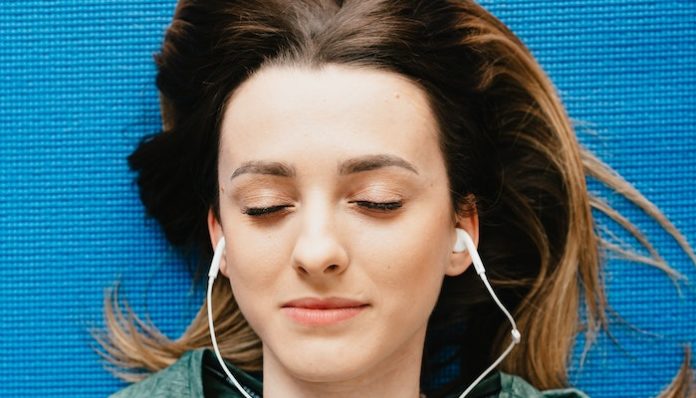
While college can be an exciting time for young adults, it can also be very stressful. Studying for tests, maintaining a social life, and dealing with new challenges (both academically and emotionally) can be exhausting. Often, college students are still in the process of developing the skills needed to cope with significant levels of stress. As with any age, stress along with several other factors can cause a range of sleep problems.
The National Sleep Foundation recommends young adults get between 7-9 hours of sleep each night. However, studies show that most college students tend to sleep less than the required time needed. Another study of college students’ sleep revealed that one in three students described their sleep as “fairly to very bad.” The lack of sleep in college students can cause many issues ranging from academic problems to falling asleep in class or even depression.
Luckily, there are many things you can do to develop better sleep habits in order to get the sleep that your body deserves. Listed below are the most common sleep issues that college students face along with solutions.
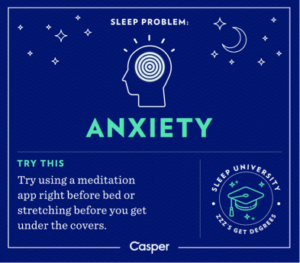
Anxiety
One of the most common mental health problems on college campuses is anxiety disorders. It can be easy to feel anxious when trying to balance school, work, friends, and family. For most of us, we are able to bounce back and work through our anxiety. But for others, anxiety can be more frequent, intense, and uncontrollable — interfering with our daily routines and disrupting our sleep patterns. If anxiety is keeping you up at night, try stretching before you get under the covers or use a meditation app right before bed.
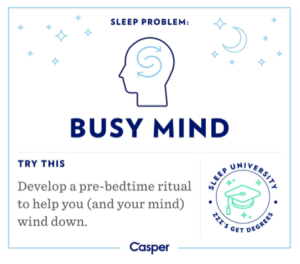
Busy Mind
As a college student, there are often nights when you can’t get your brain to turn off long enough to fall asleep. Whether you’re mentally reviewing your day, previewing the next day ahead, or even reliving an embarrassing moment that happened in the past, a busy mind can keep you up all night. One of the best ways to quiet your mind is to develop a pre-bedtime ritual to help you and your mind wind down.
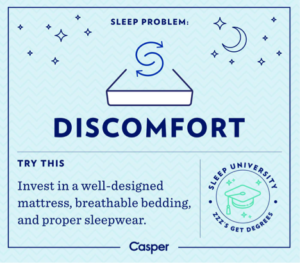
Discomfort
College dorm rooms certainly aren’t known for their comfortable beds. Unlike the mattress you are familiar with at home, the one in your dorm may be stiff and much smaller than what you are used to. An uncomfortable bed can lead to tossing and turning throughout the night. That being said, it’s important that you’re able to get some quality sleep during your time at school. Mattress pads, breathable bedding, and proper sleepwear are great ways to help make your bed more comfortable. Also, a good pillow is just as important as a mattress, so be sure to invest in a comfortable pillow as well. Unfortunately, many times the beds in dorm rooms can have bed bugs which are our worst nightmare. InsideBedroom website is giving some tips to get rid of them easily if this ever happens to you.
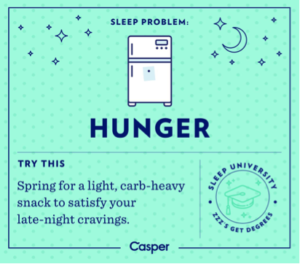
Hunger
Going to bed on an empty stomach can lead to discomfort and possibly even waking up in the middle of the night. While we sleep our digestive system slow down, but our hunger pangs can disrupt our rest. If hunger is disrupting your sleep, try a light-carb heavy snack to cure your late-night cravings;void caffeine, alcohol, and foods high in fat.
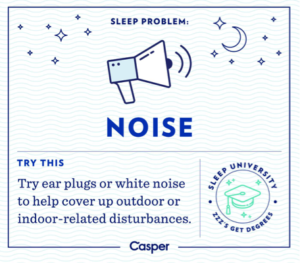
Noise
In college, there’s a time to study and a time to party. Unfortunately, your fellow residents may be doing one while you’re doing the other. Sadly, you can’t request a soundproof dorm for those nights where you have a big test to study for while your neighbors are blasting their music. And we all know that as soon as you ask your neighbor to keep the volume down, the second you get back to your dorm room the volume goes right back up. To help cover-up those noise disturbances, try earplugs or white noise.
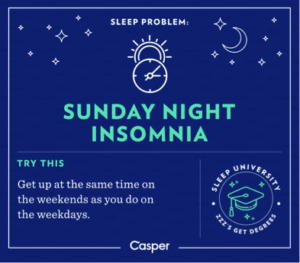
Sunday Night Insomnia
After a weekend of partying and trying to finish assignments last minute, sleeping is hard to achieve on Sundays. While there is nothing wrong with going out and having a few cocktails, drinking excessively is very bad for your sleep as it messes with the two most important phases of sleep. As the alcohol wears off, your sleep becomes lighter causing you to be awakened more easily. Another issue with the weekends is that they allow you to get in more hours of sleep than normal. In order to prevent Sunday Night Insomnia, try getting up at the same time on the weekends as you do on the weekdays.
Sleep debt has both short and long-term effects on our health, bodies, and how we function. Poor sleep can lead to memory issues, irritability, depression, and anxiety. As a college student it is important to get the amount of sleep that your body needs in order to be alert, productive, healthy, and happy. While there may not always be ideal conditions and situations during your time away to get the recommended amount of sleep needed, there are many ways to combat these issues.
Featured Image via Pexels


















